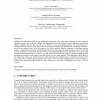31 search results - page 1 / 7 » Making sense of student use of nonverbal cues for intelligen... |
OZCHI
2005
ACM
13 years 10 months ago
2005
ACM
Many software systems would significantly improve performance if they could interpret the nonverbal cues in their user’s interactions as humans normally do. Currently, Intellige...
HCI
2009
13 years 2 months ago
2009
This paper describes two affect-sensitive variants of an existing intelligent tutoring system called AutoTutor. The new versions of AutoTutor detect learners' boredom, confusi...
AAAI
1998
13 years 6 months ago
1998
One of the most important problems for an intelligent tutoring system is deciding how to respond when a student asks for help. Responding cooperatively requires an understanding o...
IADIS
2003
13 years 6 months ago
2003
Intelligent tutoring systems (ITS) provide individualised instruction. They offer many advantages over the traditional classroom scenario: they are always available, non-judgement...
UM
2005
Springer
13 years 10 months ago
2005
Springer
Intelligent tutoring systems help students acquire cognitive skills by tracing students’ knowledge and providing relevant feedback. However, feedback that focuses only on the cog...

